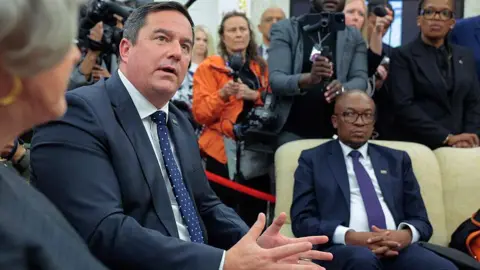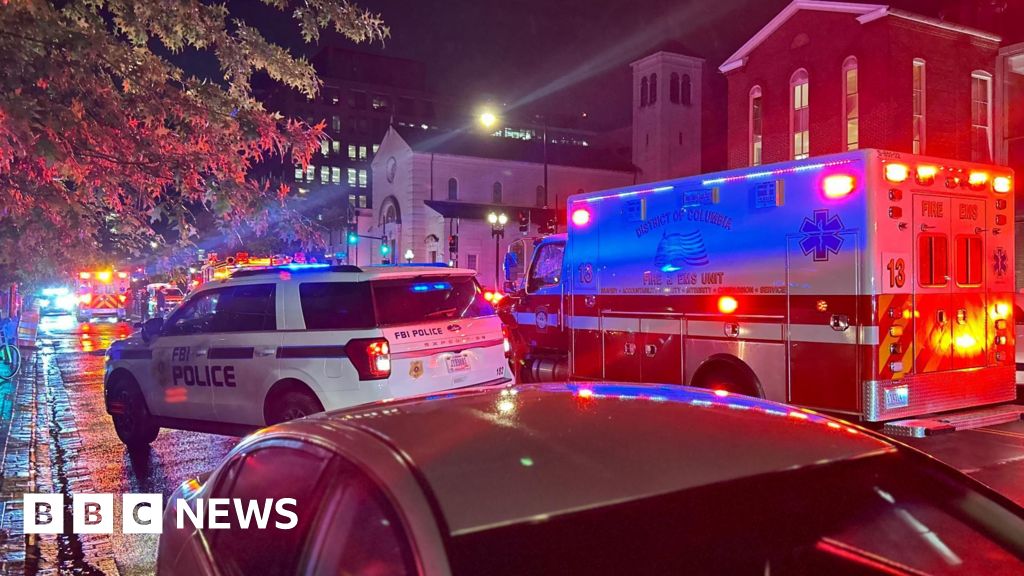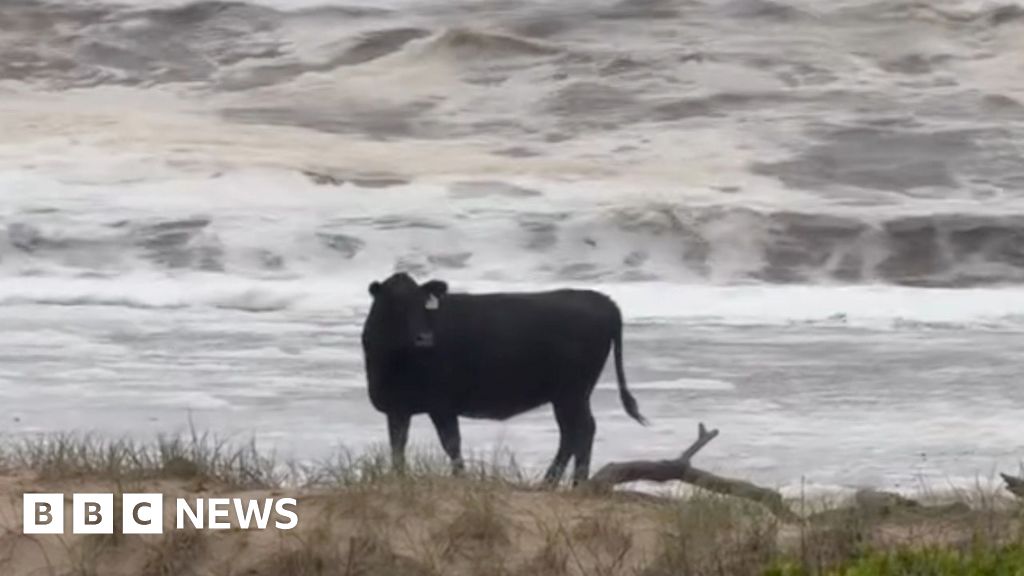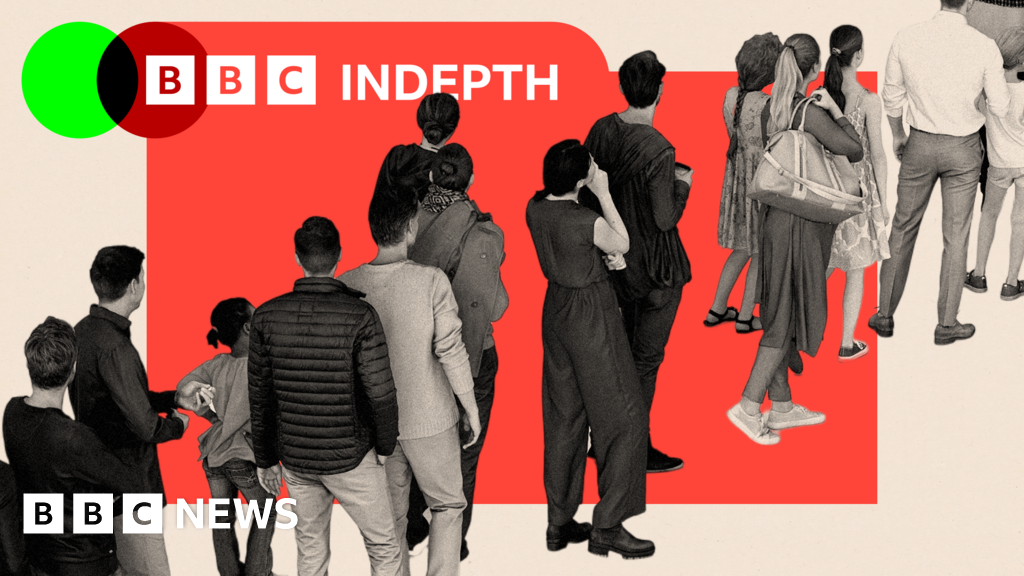Watch moment Trump confronts South Africa's president with video
US President Donald Trump confronted his South African counterpart at the White House on Wednesday with a video Trump said supported his claim that white farmers were being "persecuted" in the country.
The footage, played during a news conference with Cyril Ramaphosa, showed thousands of crosses lining a road that Trump claimed marked burial spots for murdered white farmers.
Trump said he did not know where in South Africa it was filmed, and the footage has not been verified by the BBC.
Ramaphosa - who appeared to weigh his response carefully - disputed Trump's allegation. He said black people were far more likely to be victims of violence in South Africa than white people.
Trump also said that he would seek an "explanation" from his guest on claims of white "genocide" in South Africa, which have been widely discredited.
Ramaphosa came to the White House on Wednesday for trade talks to reset US-South African relations. He hoped to charm Trump with the inclusion of two of South Africa's best-known golfers in the delegation. Ramaphosa also came equipped with a gift of a huge book featuring his country's golf courses.
But after a cordial start, the mood in the Oval Office shifted as Trump asked for the lighting to be lowered for a video.
- Is there a genocide of white South Africans as Trump claims?
- Do Afrikaners want to take Trump up on his refugee offer?
- 'I didn't come here for fun' - Afrikaner defends refugee status in US
The film featured the voice of leading South African opposition figure Julius Malema singing: "Shoot the Boer [Afrikaner], Shoot the farmer". It then showed a field of crosses, which the US president, talking over the images, said was a burial site of white farmers. The crosses actually were part of a protest, not graves, over farmers who have been killed.
Trump also handed Ramaphosa what appeared to be print-outs of stories of white people being attacked in South Africa.
"What you saw - the speeches that were made... that is not government policy," Ramaphosa said, responding to the video. "We have a multiparty democracy in South Africa that allows people to express themselves.
"Our government policy is completely against what he [Malema] was saying even in the parliament and they are a small minority party, which is allowed to exist according to our constitution."
Watch: Trump greets South Africa's Cyril Ramaphosa at White House
Referring to the crosses in the video, Trump later said, "The farmers are not black. I don't say that's good or bad, but the farmers are not black..."
Claims of genocide in South Africa have circulated among right-wing groups for years. In February, a South African judge dismissed the claims as "clearly imagined" and "not real", when ruling in an inheritance case involving a donation to white supremacist group.
Ramaphosa said Wednesday that he hoped Trump would listen to the voices of South Africans on this issue. He pointed out the white members of his delegation, including golfers Ernie Els and Retief Goosen, and South Africa's richest man Johann Rupert.
"If there was a genocide, these three gentlemen would not be here," Ramaphosa said.
Trump interrupted: "But you do allow them to take land, and then when they take the land, they kill the white farmer, and when they kill the white farmer nothing happens to them."
"No," Ramaphosa responded.
The US leader seemed to be referencing that Malema and his party, who is not part of the government, have the power to confiscate land from white farmers, which they do not.
He also appeared to mention a controversial law signed by Ramaphosa earlier this year, which allows the government to seize privately-owned land without compensation in some circumstances. The South African government says no land has yet been seized under the act.
Speaking to Trump on Wednesday, Ramaphosa did acknowledge that there was "criminality in our country... people who do get killed through criminal activity are not only white people, the majority of them are black people".
South Africa does not release race-based crime figures, but the latest figures show that nearly 10,000 people were murdered in the country between October and December 2024. Of these, a dozen were killed in farm attacks and of the 12, one was a farmer, while five were farm dwellers and four were employees, who are likely to have been black.
As Trump pressed the issue, Ramaphosa stayed calm - and tried to work his charm by making a joke about offering a plane to the US.
He invoked the name of anti-apartheid icon Nelson Mandela, saying South Africa remained committed to racial reconciliation.

 Getty Images
Getty Images
South Africa Agriculture Minister John Steenhuisen was invited to speak about the experience of farmers
When a journalist asked what would happen if white farmers left South Africa, Ramaphosa deflected the question to his white agriculture minister, John Steenhuisen, who said that most farmers wanted to stay.
But Trump kept firing salvoes at Ramaphosa, who avoided entering into a shouting match with him - something that happened to Ukrainian President Volodymyr Zelensky when he met Trump in the same room in February.
Earlier this month, a group of 59 white South Africans arrived in the US, where they were granted refugee status. Ramaphosa said at the time they were "cowards".
Before Wednesday's White House meeting, South Africa's leader had stressed that improving trade relations with the US was his priority.
South African exports into the US face a 30% tariff once a pause on Trump's new import taxes ends in July.
After the confrontation, Malema mocked the meeting, describing it as "a group of older men meet in Washington to gossip about me."
"No significant amount of intelligence evidence has been produced about white genocide. We will not agree to compromise our political principles on land expropriation without compensation for political expediency," he posted on X.
Watch: Rubio and Kaine clash over white South African refugees
Tensions between South Africa and the US ramped up days after Trump took office for his second term in January.
It was at that point that Ramaphosa signed into law the controversial bill that allows South Africa's government to expropriate privately-owned land in cases when it is deemed "equitable and in the public interest".
The move only served to tarnish the image of Africa's biggest economy in the eyes of the Trump administration - already angered by its genocide case against Israel at the International Court of Justice.
In February, the US president announced the suspension of critical aid to South Africa and offered to allow members of the Afrikaner community - who are mostly white descendants of early Dutch and French settlers - to settle in the US as refugees.
South Africa's ambassador to Washington, Ebrahim Rasool, was also expelled in March after accusing Trump of "mobilising a supremacism" and trying to "project white victimhood as a dog whistle".
Additional reporting by Khanyisile Ngcobo and Farouk Chothia
More on South African-US relations:

 Getty Images/BBC
Getty Images/BBC









 English (US) ·
English (US) ·